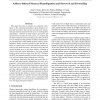741 search results - page 2 / 149 » Memory Dependence Prediction Using Store Sets |
MICRO
2005
IEEE
13 years 11 months ago
2005
IEEE
Conventional processors use a fully-associative store queue (SQ) to implement store-load forwarding. Associative search latency does not scale well to capacities and bandwidths re...
MICRO
1997
IEEE
13 years 9 months ago
1997
IEEE
We revisit memory hierarchy design viewing memory as an inter-operation communication agent. This perspective leads to the development of novel methods of performing inter-operati...
ISCA
2008
IEEE
13 years 11 months ago
2008
IEEE
Modern processors rely on memory dependence prediction to execute load instructions as early as possible, speculating that they are not dependent on an earlier, unissued store. To...
MICRO
2005
IEEE
13 years 11 months ago
2005
IEEE
This paper describes a scalable, low-complexity alternative to the conventional load/store queue (LSQ) for superscalar processors that execute load and store instructions speculat...
MICRO
2006
IEEE
13 years 11 months ago
2006
IEEE
This paper presents NoSQ (short for No Store Queue), a microarchitecture that performs store-load communication without a store queue and without executing stores in the outof-ord...

